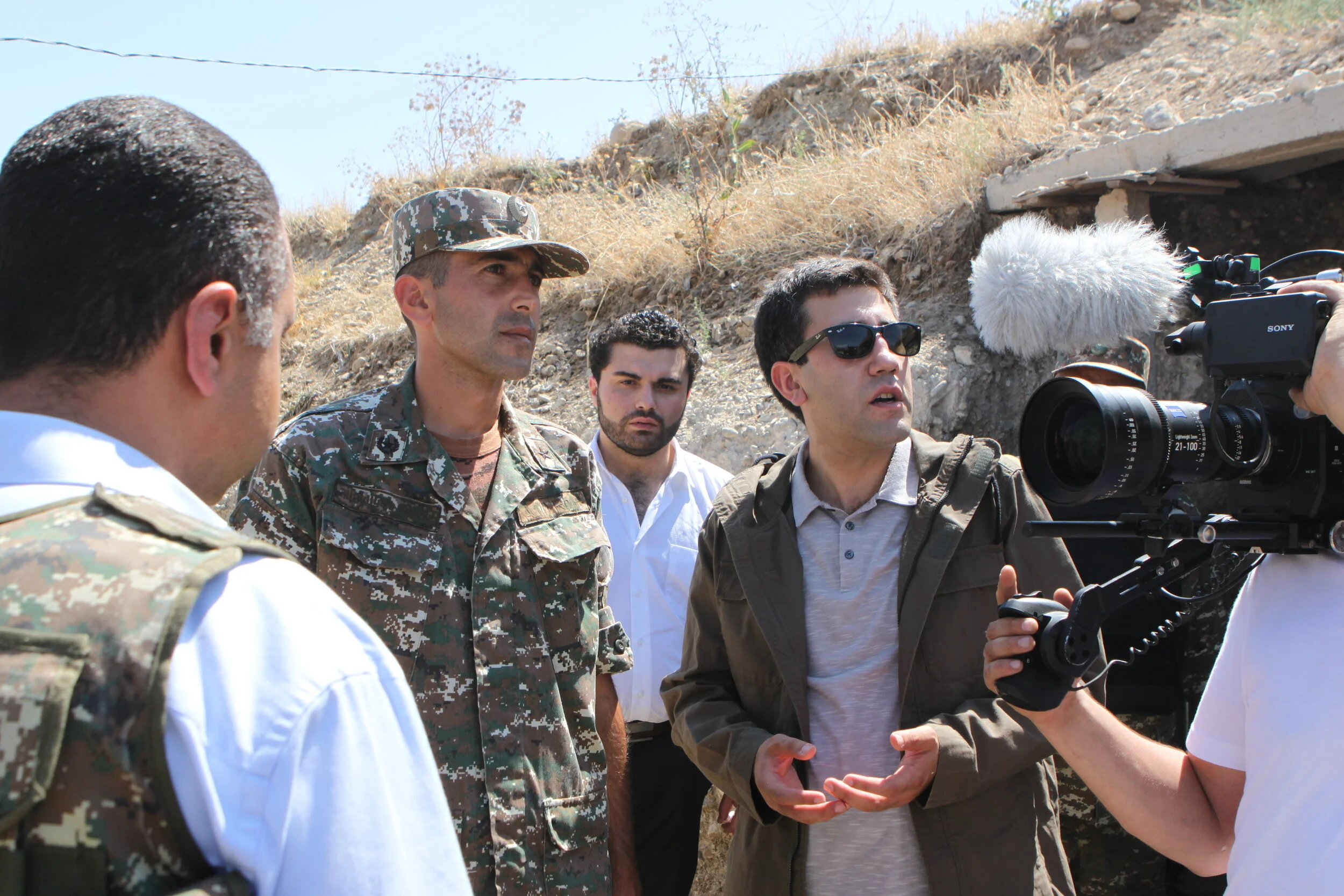Briefing on the conflict between Azerbaijan and Armenia
The complex and violent history that Artsakh (Nagorno Kharabakh) and Armenia share with Azerbaijan is long and perplex. The two sides have fought over the Artsakh region, and the dispute has constantly meant armed conflict and loss of lives. Azerbaijan continues to claim authority over Artsakh through military violence and political play, and the world is doing little more than watching from the sidelines.
One Free World International led a humanitarian mission to Karabakh in 2017, Majed El Shafie (left) is seen here on the front lines being briefed by local officials.
On September 27, 2020 the most serious and large-scale clashes since 2016 have raised the spectre of a new war between Azerbaijan and Nagorno Kharabakh.
Azerbaijan and Turkey jointly continue large-scale aerial, missile and land attacks along the entire line of contact between Artsakh (Nagorno Kharabakh) and Azerbaijan, aiming to resolve the Nagorno Kharabakh conflict by military means. To this end, Azerbaijan has put forwarded its entire military capacities, reinforced by Turkish military assistance, which also includes extremist terrorist fighters transferred from other conflict zones in the Middle East.
Artsakh, Armenia, OSCE Minsk Group Co-chair countries have repeatedly called and warned the entire international community to stop aggression, hostilities and deliberate targeting of civilian population. On October 3rd,Azerbaijan attacked Kut village in the Vardenis region of the Republic of Armenia and on the morning of October 4th Azerbaijani armed forces started attacks on the cities of Stepanakert (the capital city of Artsakh) and Martakert, using long-range missiles and involvement of the air force, which resulted in human loss and serious damages in civilian settlements and infrastructures in Stepanakert.
The attacks are mostly carried out with the coordination of the Turkish military specialists and with the military equipment and armaments provided by Turkey to Azerbaijan within the framework of their military-political cooperation.
Sadly, Israel actively supports Azerbaijan in this conflict, continuing its arms sales to Azerbaijan. On October 2nd , Armenia recalled its Ambassador to Israel, issuing a rare diplomatic rebuke over Israel’s arms sales to rival Azerbaijan.
To prevent deliberate targeting of civilian population, the Defense Army of Artsakh was forced to attack the military airport in Ganja, Azerbaijan.
Azerbaijani armed forces continue deliberate targeting of journalists with the use of artillery and other heavy weaponry with the aim to hinder the coverage from the conflict zone. All journalists have been attacked in the civilian settlements of Artsakh while carrying out their professional activities. Azerbaijan’s actions constitute a blatant violation of international humanitarian law and should be strongly condemned by the International Community. Azerbaijan only provides access to Turkish and Azerbaijani journalists and denies the access of the international media to hinder the objective and independent reporting on the conflict.
On October 2, the president of Turkey said, “I hope Azerbaijan will keep fighting until all its lands in Kharabakh are freed”. The Foreign Minister of Turkey warned against attempts to cast shadows on Turkey’s support to Azerbaijan, saying,” We are one nation with Azerbaijan. We are two separate states but we act as one if needed”.
These actions aim at depriving the people of Artsakh of their historical homeland by perpetrating mass atrocities. One Free World International stands with justice and finds the deliberate targeting of the civilian population and infrastructure of Artsakh by the military-political leadership of Azerbaijan a gross violation of the international humanitarian law, and the latter should bear full responsibility for this war crime.
Being a NATO member, Canada should condemn violence and urge NATO to end this conflict. The International Trade and Aid should concentrate on improving the human rights record in Azerbaijan and Turkey, stopping them from violating the human rights of the civilians of their neighbour country and averting the danger of war. Canada should send observers to monitor the situation on the ground and to take peace-making measures.
One Free World International is ready and eager to present humanitarian aid to the civilians suffering and hurt in the conflict.


